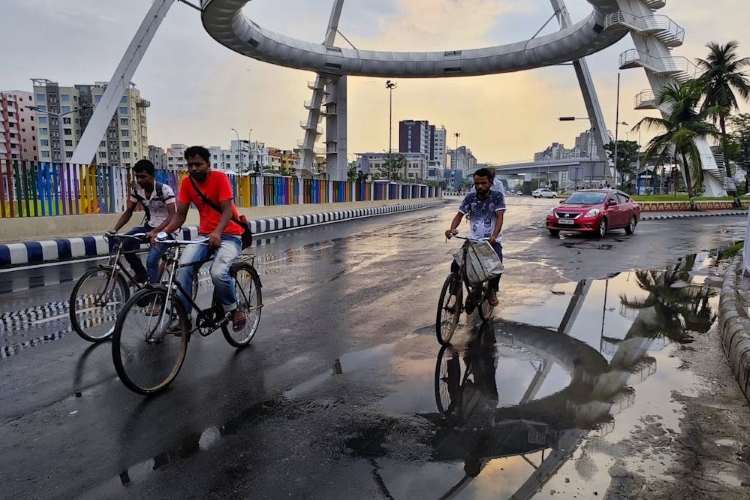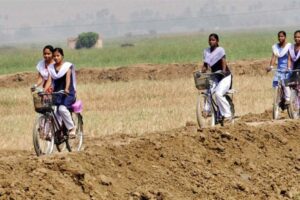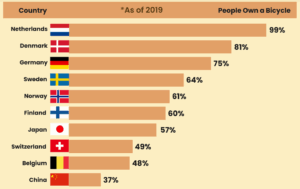
World Bicycle Day 2025: Earlier this month, Paris claimed the top spot in the Cycle-Friendly City Ranking 2025, released by the Clean Cities Campaign. Once infamous for traffic gridlock and choking pollution, the French capital has undergone a striking transformation. It now serves as a global exemplar of cycling infrastructure and sustainable urban mobility.
That Paris has emerged as a beacon for cyclists is significant not only in a European context but also for cities that once aspired to emulate it—like Jaipur, the capital of Rajasthan. Often dubbed the Paris of India for its planned layout and architectural symmetry, Jaipur shares surprising historical and urban design parallels with the French capital. But when it comes to embracing cycling as a serious mode of transport, Jaipur trails far behind.
READ I Public finance: Reclaiming India’s forgotten fiscal canon
Shared foundations, divergent futures
Jaipur was designed in the 18th century by Maharaja Sawai Jai Singh II, its streets laid out in a grid-like pattern reminiscent of Enlightenment-era urban planning ideals. The city’s broad avenues and organised sectors suggest great potential for accommodating cycle-friendly infrastructure. But this potential remains largely untapped.

Despite its favourable layout, Jaipur has succumbed to a car-centric development model. Infrastructure favours speed and volume over safety and sustainability. Wide roads have become conduits for fast-moving vehicles, and bicycles are relegated to the margins—figuratively and literally. The stark contrast between Paris and Jaipur reveal a missed opportunity and the urgent need for a policy rethink.
The significance of World Bicycle Day
World Bicycle Day, observed annually on June 3 and formally recognised by the United Nations in 2018, is more than symbolic. It highlights the bicycle as a simple, affordable, and clean mode of transport—critical to achieving the sustainable development goals. Bicycles reduce emissions, ease congestion, and promote public health, especially in dense urban environments struggling with rising pollution and healthcare burdens.
Countries with the highest cycle usage

The World Health Organisation has long advocated for walking and cycling infrastructure as a pathway to health equity. For cities like Jaipur, battling toxic air and traffic snarls, cycling represents a pragmatic and inclusive solution. Yet, the policy commitment required to mainstream cycling is still missing.
India’s cycling moment: A necessity, not a luxury
India’s urban centres are buckling under the twin pressures of rapid urbanisation and deteriorating air quality. Cities such as Delhi, Mumbai, and Bengaluru witness daily gridlocks, where the average commuter spends hours stuck in traffic. For many, the humble bicycle has re-emerged as a time-saving, cost-effective alternative.
But the significance of cycling goes beyond logistics. According to WHO estimates, air pollution contributes to millions of premature deaths in India annually, aggravating respiratory diseases, strokes, and heart conditions. Promoting cycling can be a critical step toward curbing these risks while reducing the nation’s overall carbon footprint. More importantly, bicycles remain the most accessible form of transport for lower-income households, who are often the most impacted by inadequate transit systems.
Jaipur’s missed opportunity
Jaipur is well-positioned to become a cycling haven. Its expansive roads and relatively flat terrain should support safe and efficient cycling. Yet, safety concerns deter most citizens from using bicycles beyond the early morning hours. Streets like JLN Marg may offer some refuge, but major arteries such as Tonk Road, Ajmer Road, and Jhotwara Road remain perilous due to heavy vehicular traffic and absent cycling infrastructure.
The problem is compounded by planning decisions that prioritise flyovers and elevated roads inaccessible to cyclists. The result is a hostile environment for non-motorised road users. In the absence of dedicated lanes, cyclists are forced to share space with fast-moving traffic, heightening the risk of accidents and further dissuading potential riders. A growing social bias against cyclists, who are often seen as impediments by motorists, exacerbates the problem.
Making Jaipur a cycle-friendly city
A truly cycle-friendly city is not only about dedicated lanes. It reflects a broader urban philosophy—one that prioritises people over cars and safety over speed. Children, women, the elderly, and the working poor all benefit when streets are designed for bicycles and pedestrians.
To make this shift, Jaipur must consider a five-point strategy:
Infrastructure first: Develop a city-wide network of protected cycle lanes integrated with public spaces and transport hubs. Safe parking zones must be included.
Policy incentives: Provide subsidies for bicycle purchases, implement Public Bicycle Sharing (PBS) systems in residential and commercial areas—not just near tourist sites.
Awareness campaigns: Launch sustained campaigns to promote cycling as healthy, aspirational, and environmentally conscious.
Smart integration: Use digital platforms to offer real-time updates on cycle routes, traffic-free paths, and parking availability.
Inclusive urban planning: Ensure that urban design frameworks account for the needs of cyclists, pedestrians, children, and the elderly alike.
These steps must be supported by a change in mindset—among policymakers, traffic authorities, and citizens. Cycling is not a poor person’s fallback option. It is the mobility solution of the future.
As India celebrates World Bicycle Day 2025, it must go beyond token gestures. The bicycle is not just a vehicle—it is a tool for climate action, a prescription for public health, and a pathway to equitable mobility. Jaipur’s grid-like blueprint, often compared to Paris, is waiting for a revival rooted in sustainable practice.
By reclaiming its streets for cyclists, Jaipur could once again become a model city—this time not for colonial comparisons but for visionary urban planning in the 21st century. Let this World Bicycle Day be the beginning of that journey. It’s time to pedal forward.
Amar Deep Singh is Senior Programme Officer at CUTS International, a global public policy research and advocacy group.
